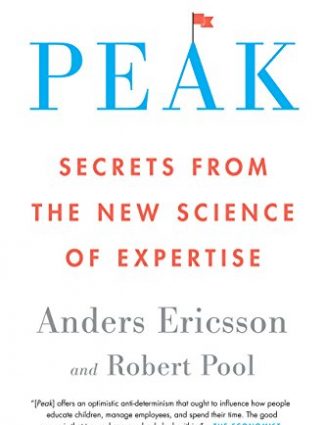Peak – secrets from the new science on expertise by Anders Ericsson and Robert Pool – book review

What is the one thing all the top-performers, athletes, have in common? This must have been the life question of Anders Ericsson, who devoted thousands of hours to expert performance research. As a curious researcher, he wanted to check what happens when a human embarks on a journey from an average to a peak performer. One of many people he helped on their way to peak performance was Joshua Foer, who won US Memory Championships in 2006 after only one year of practice (you can find my review of his book in this post). Ericsson did not find any proof for the existence of some innate talents or abilities, causing top-achievers to outperform others. Instead, he is convinced that what connects all the world class performers is the deliberate practice. Using principles of purposeful practice, he could train an average student to remember 80 digits.
10 000 hours are not enough
In 1993 Ericsson together with Ralf Krampe and Clemens Tesch-Römer published a study of the Berlin violin students that has received a lot of attention a few years later when Malcolm Gladwell published his book ‘Outliers’. Gladwell states that it is enough to train for 10 thousand of hours to achieve expert performance. Ericsson shows, this was not the result of his study. Some violinists had put as much time of training before they were 20, however they were still studying and nowhere near of expert performance.
Author debunks the 10 thousand hours rule as this is not always sufficient to reach top level. Yet expertise can be achieved by applying deliberate practice, which is focused, goal driven and requires constant feedback about the progress. As soon as we reach a plateau and don’t see any progress, we need to push ourself out of the comfort zone and make a skill we’re working on a little harder. The way to achieve expertise might be shortened by employing a teacher or an expert, who has already done what we’re trying to achieve.
The purpose of deliberate practice is to create high quality mental representations of the skill that we learn. These mental structures that correspond to an idea or an object are very well developed in the minds of expert performers and allow the best chess players to play many chess games simultaneously while blindfolded.
Raise a genius
Although this book is not a parenting guide, there are a few hints for parents. First thing I have learnt is that ‘geniuses are born not made’. A Hungarian chess teacher and psychologist, László Polgár has proven that he can raise a genius. He conducted his experiment on his own three daughters, who he trained to become champions in chess.
According to author any skill can be learned with help of deliberate practice, thus it is completely not justified to say to someone, especially kids, that they are bad at something, as they will quickly believe it and won’t even try to improve. Conversely labeling someone as talented will put him in a spotlight and make him believe he has some innate abilities, which motivates him to work more on these skills.
This book is definitely worth reading and worth of receiving my highest note. Deliberating is the fact that the expertise is open to anyone. By applying the principles of purposeful practice one can regain control of his life and might be actively shaping it instead of reactively waiting for what life will bring. There is no more excuse to start singing, dancing or whatever we say we suck at.
